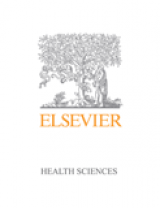New to this edition
- NEW! Thoroughly revised and updated information
mirrors content from the 9th edition of the McCance & Huether’s Pathophysiology textbook.
- NEW! Over 40 detailed case scenarios provide real-world examples of how pathophysiology is used in the clinical setting, helping you integrate knowledge, develop clinical judgment, and apply theory to practice.
Author Information
By Julia Rogers, DNP, APRN, CNS, FNP-BC, FAANP, Associate Professor, DNP Program Coordinator, College of Nursing, Purdue University Northwest, Hammond, Indiana; Nurse Practitioner, Medical Staff, Northwest Medical Group Pulmonary and Critical Care Medicine, Valparaiso, Indiana and Hospitalist Nurse Practitioner, Medical Staff, TeamHealth, Valparaiso, Indiana, USA
UNIT ONE THE CELL
1. Cellular Biology
2. Altered Cellular and Tissue Biology: Environmental Agents
3. The Cellular Environment: Fluids and Electrolytes, Acids and Bases
UNIT TWO GENES AND GENE-ENVIRONMENT INTERACTION
4. Genes and Genetic Diseases
5. Genes, Environment-Lifestyle, and Common Diseases
6. Epigenetics and Disease
UNIT THREE MECHANISMS OF SELF-DEFENSE
7. Innate Immunity: Inflammation and Wound Healing
8. Adaptive Immunity
9. Alterations in Immunity and Inflammation
10. Infection
11. Stress and Disease
UNIT FOUR CELLULAR PROLIFERATION: CANCER
12. Cancer Biology
13. Cancer Epidemiology
14. Cancer in Children
UNIT FIVE THE NEUROLOGIC SYSTEM
15. Structure and Function of the Neurologic System
16. Pain, Temperature Regulation, Sleep, and Sensory Function
17. Alterations in Cognitive Systems, Cerebral Hemodynamics, and Motor Function
18. Disorders of the Central and Peripheral Nervous Systems and the Neuromuscular Junction
19. Neurobiology of Schizophrenia, Mood Disorders, Anxiety Disorders, and Obsessive-Compulsive Disorder
20. Alterations of Neurologic Function in Children
UNIT SIX THE ENDOCRINE SYSTEM
21. Mechanisms of Hormonal Regulation
22. Alterations of Hormonal Regulation
23. Obesity, Starvation, and Anorexia of Aging
UNIT SEVEN THE REPRODUCTIVE SYSTEMS
24. Structure and Function of the Reproductive Systems
25. Alterations of the Female Reproductive System
26. Alterations of the Male Reproductive System
27. Sexually Transmitted Infections
UNIT EIGHT THE HEMATOLOGIC SYSTEM
28. Structure and Function of the Hematologic System
29. Alterations of Erythrocyte, Platelet, and Hemostatic Function
30. Alterations of Hematologic Function in Children
UNIT NINE THE CARDIOVASCULAR AND LYMPHATIC SYSTEMS
32. Structure and Function of the Cardiovascular and Lymphatic Systems
33. Alterations of Cardiovascular Function
34. Alterations of Cardiovascular Function in Children
UNIT TEN THE PULMONARY SYSTEM
35. Structure and Function of the Pulmonary System
36. Alterations of Pulmonary Function
37. Alterations of Pulmonary Function in Children
UNIT ELEVEN THE RENAL AND UROLOGIC SYSTEMS
38. Structure and Function of the Renal and Urologic Systems
39. Alterations of Renal and Urinary Tract Function
40. Alterations of Renal and Urinary Tract Function in Children
UNIT TWELVE THE DIGESTIVE SYSTEM
41. Structure and Function of the Digestive System
42. Alterations of Digestive Function
43. Alterations of Digestive Function in Children
UNIT THIRTEEN THE MUSCULOSKELETAL SYSTEM
44. Structure and Function of the Musculoskeletal System
45. Alterations of Musculoskeletal Function
46. Alterations of Musculoskeletal Function in Children
UNIT FOURTEEN THE INTEGUMENTARY SYSTEM
47. Structure, Function, and Disorders of the Integument
48. Alterations of the Integument in Children
UNIT FIFTEEN MULTIPLE INTERACTING SYSTEMS
49. Shock, Multiple Organ Dysfunction Syndrome, and Burns in Adults
50. Shock, Multiple Organ Dysfunction Syndrome, and Burns in Children
Answer Key




